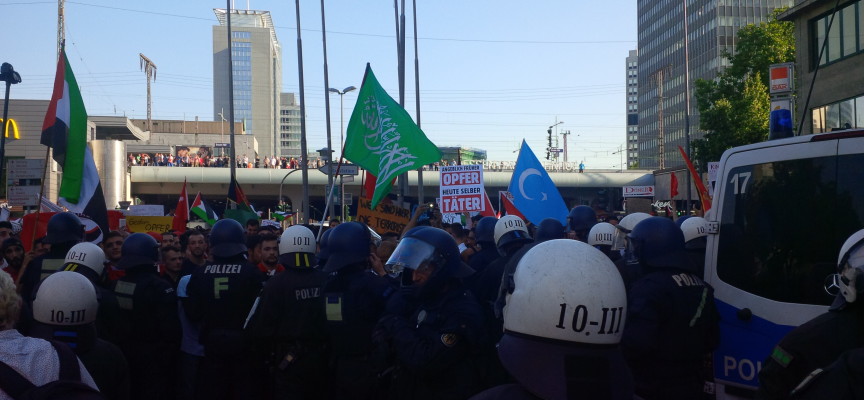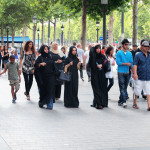In Germany today, the media and teachers are very active against anti-Semitism, against the latent hostility toward Jews and Judaism. However, in the context of the Gaza war, last summer, in many places “anti-Israel” rallies were organized which degenerated into demonstrations of anti-Semitism.
As for the policy of the Israeli government, we may have different opinions. But it is very worrying when you see people waving posters which deny the Shoah or compare the State of Israel to National Socialism, or people shouting slogans such as “Let’s send the Jews to the gas” or “Hitler, Hitler!” as it was the case in Essen on Friday, July 18, 2014, on the Willy-Brandt Platz, in front of the main railway station. On Facebook some people have incited to the “destruction” (sic!) of the Old Synagogue and 18 people were detained in suspicion. Eight policemen with machine guns were placed around the building and a double fence was erected around this museum that had become a fortress.
Uncritical solidarity with the Gaza population and the Hamas movement leads to radical forms of anti-Semitism. Under the effect of intense emotions, some people cannot distinguish between a municipal museum such as the Old Synagogue in Essen, or a Jewish community in Germany, and the policy of a Middle Eastern State.
To raise awareness and to inform
We are disappointed in observing that over the years the education of these protesters did not produce any democratic behaviour nor the ability to distinguish between the Jews in Germany, Israel, and the policy of the Israeli government. On the contrary, many cultivate within themselves a seed of violence against people and property. Here the State must set the limits, otherwise it runs the risk of being considered weak and a multiplication of increasingly serious aggressions. As most of Hamas supporters are Muslims, we should act in this area. Muslims should recognize that Islam has been strongly influenced by Judaism, and the Koran has incorporated some Jewish religious traditions. Muslims should be aware that the Jewish history of Turkey or Morocco belong to their origins and culture. In the Ottoman Empire there was a peaceful coexistence of Muslims, Jews, and Christians. Vice-versa, we had the outstanding pan-European persecutions in the heart of “Christian” Europe during the First Crusade (1096) and the Black Death (1348-1349), as well as the Inquisition in Castile and Portugal in the sixteenth and seventeenth centuries, with thousands of victims burned alive. Teachers must be made aware of the need to study these issues, which are alien to them. University Departments such as “practical philosophy” in North Rhine-Westphalia, or “ethics” in other Bundesländern, should prepare the ground for publications on the relationship between Judaism and Islam. It might be interesting for Muslims to know how a minority of non-Christians – the Jews – has been able to maintain its religious identity for over a thousand years in Western Europe, and how it has dealt with issues such as integration with respect to assimilation.
Disposal of the German past?
As for the opinion of the majority of the population, as several studies have confirmed, about a fifth of the German population follows anti-Semitic stereotypes. According to a long study conducted by the University of Bielefeld, these are stronger among those who have low education and among the elderly. Religious affiliation plays almost no role at all, although the “traditional” anti-Semitic prejudices are somewhat more frequent among Roman Catholics than among Evangelicals. If you make a comparison at an international level, some stereotypes are more frequent in Germany. For example, 49% of Germans are convinced “that Jews have taken advantage of the role of victims”, against 72% of Polish, and only 22% of British. The opinion that “because of Israel (!) people do not like Jews” is endorsed by 55% of the population in Poland, but only 25% in Italy. In Hungary, 70% considers that “Jews have too much influence”, in Poland 50%, while in Germany only 20%. Particularly unpopular is reminding to Germans their mass murder of European Jews: 64.6% is contrary to throwing it in the Germans’ teeth. 56% agree with the radical assertion that “Israel is conducting a war of extermination” against Palestinians. In this formulation, one cannot avoid the impression that Germans are trying to compensate their own history by going against the behaviour of Israel against Palestinians – an all too transparent attempt to “dispose” of the German past.
Judaism today
Jews in Germany are a group with no visibility in daily life, made up of approximately 100,000 members of organized communities and about two thousand “unorganized” individuals, on a total population of 84 million. Normality and visibility, such as those experienced in New York, London, or Paris, do not exist. A fortiori, study programs should not be restricted to explaining Judaism as a simple background of Jesus Christ, as it is the case in the teaching of Christian religion, but they should also explore Judaism today in its variety. Teachers of history should say something of Jewish life in Europe and the United States after 1945. Christian Celebrations might sometimes use the Hebrew Bible or the Jewish interpretation of the Bible. In addition, this initiative has been approved by the Pontifical Biblical Commission. Christians would benefit from the knowledge of the Jewish exegetical tradition and, in so doing, they would also keep their own matrix.
Unrestrained and aggressive
In general terms, we can say that anti-Semitism is nothing new, but last summer it broke out more unrestrainedly and aggressively than usual. Anti-Semitism in connection to Israel is more visible today, perhaps even more than the “classic” anti-Semitism of the radical right-wing. However there are many people who through open discussions, an increased awareness, education, and knowledge, are willing to re-think their ideas critically and learn something new. It would be wrong not to do anything, just when the foreign media in the Arab and Turkish area are strengthening their anti-Semitic prejudices. We must not give them a free hand.
Overcoming the old clichés
Churches since 1960 have been standing aloof from theological anti-Judaism and anti-Semitism; certain things – but not all of them – went back to the base. The christian groups that deny the Holocaust – such as the Society of St. Pius X – are marginal, as well as those which accuse the popes for their visits to synagogues (kreuz.net). The old stereotypes of the rigid laws of religion – which actually have no connection to the religious sphere – have to face today the opposition of theologians who are very active within the Church, while these ideas belonged to the majority of Catholics until the ’50s.
A legitimate part of the European tradition
A democratic culture and a democratic society in Germany should recognize religion, culture, and Jewish history as a legitimate part of the European tradition. The relations between Judaism and Islam, but also the variety of Judaism today, or the Jewish interpretation of the Hebrew Bible, are unfortunately still largely unknown. All that we can learn from the variety of Judaism would contribute to the integration of society and peaceful coexistence, and we should take advantage of this opportunity.
Man kann bezüglich der israelischen Regierungspolitik unterschiedlicher Auffassung sein. Doch Plakat schwenken, auf denen die Schoah geleugnet wird oder der Staat Israel mit dem NS-Unrechtsstaat gleichgesetzt wird, ja Parolen schreien, wie “Juden ins Gas” oder “Hitler, Hitler”, wie in Essen am Freitag, den 18. Juli 2014 auf dem Willy-Brandt-Platz vor dem Hauptbahnhof, ist sehr bedenklich. Auf Facebook wurde zuvor zur “Vernichtung” (so!) der Alten Synagoge aufgerufen und 18 Personen mussten in Sicherheitsgewahrsam genommen werden. Acht Polizisten standen damals mit Maschinenpistolen ums Haus und ein zweifacher Gitterzaun ließ dieses städtische Museum wie eine Festung erscheinen.
Hier führt eine völlig unkritische Solidarität mit den Menschen in Gasa und der Hamas-Bewegung zu radikal antisemitischen Äußerungen. Vor lauter Emotionen wird nicht zwischen einem städtischen Museum wie die Alten Synagoge Essen oder einer jüdischen Gemeinde in Deutschland und der Politik eines Staates im Nahen Osten unterschieden. Eine der Ursachen für dieses Verhalten mögen persönliche reale und eingeflößte Frustrationen wegen mangelnden beruflichen und privaten Fortkommens sein.
Sensibilisieren und informieren
Doch ist es bedauerlich festzustellen, dass deutsche Schulbildung über Jahre bei diesen Demonstranten weder demokratisches Verhalten noch die Fähigkeit zur Differenzierung zwischen Juden in Deutschland, Israelis und dortiger Regierungspolitik erzeugt haben. Im Gegenteil, es besteht bei nicht wenigen eine Gewaltbereitschaft gegen Sachen und Menschen. Hier muss der Staat Grenzen aufzeigen, da dieser sonst als schwach eingeschätzt wird und sich Übergriffe vermehren und verschlimmern werden. Dies gilt besonders für jene Personen mit Duldungsstatus: Es besteht keine Veranlassung solche, die sich gesetzeswidrig verhalten, einzubürgern. Da sich unter den Sympathisanten für die Hamas vor allem Muslime befinden, wäre es in diesen Milieus angezeigt, zu wirken. Muslime sollten erkennen, dass der Islam stark durch jüdische Einflüsse geprägt worden ist, dass der Koran jüdisch-religiöse Traditionen aufgenommen hat. Sie sollten die jüdische Geschichte etwa der Türkei oder Marokkos als Teil ihrer Herkunftsgeschichte und Kultur wahrnehmen. Es gab im Osmanischen Reich durchaus ein friedliches Nebeneinander von Muslimen, Juden und Christen. Dagegen heben sich die europaweiten Verfolgungen im “christlichen” Europa anlässlich des Ersten Kreuzzuges (1096) und des Schwarzen Todes (1348/49) wie auch die Inquisition in Kastilien und Portugal im 16. bis 18. Jahrhundert mit tausenden lebendig verbrannten Opfern, denen heimliches “Judaisieren” unterstellt wurde, negativ ab. Hier müssen Lehrer sensibilisiert werden, sich auf ihnen fremde Themen einzulassen. Fächer wie “Praktische Philosophie” in NRW oder “Ethik” in anderen Bundesländern sollten zum Thema Judentum und Islam Handreichungen herausgeben. Es könnte für Muslime spannend sein zu erfahren, wie eine nichtchristliche Minderheit – die Juden – über tausend Jahre in Westeuropa ihre religiöse Identität aufrechterhalten konnte und wie sie sich mit Fragen wie Integration gegenüber Assimilation auseinandergesetzt hat.
Entsorgung deutscher Vergangenheit?
Was die Einstellung der Mehrheitsbevölkerung angeht, so kommen verschiedene Studien zu vergleichbaren Schlüssen, dass etwa ein Fünftel der deutschen Bevölkerung judenfeindliche Stereotypen hegt. Stärker sind diese nach einer Langzeitstudie der Universität Bielefeld in Schichten mit wenig Bildung und bei älteren Menschen. Die Konfessionszugehörigkeit spielt kaum eine Rolle, allenfalls sind die “traditionellen” antijüdischen Vorurteile bei Katholiken etwas stärker präsent als bei evangelischen Christen. Bei gewissen Stereotypen finden sich aber im internationalen Vergleich für Deutschland hohe Werte. So sind 49% der Deutschen überzeugt “dass die Juden Vorteile aus der Opferrolle” zögen, in Polen meinen dies 72%, in Großbritannien aber nur 22%. Das man “zu Recht wegen Israel (!) Juden nicht möge”, meinen in Polen 55% der Einwohner, aber nur 25% in Italien. In Ungarn vertreten 70% der Bevölkerung die Auffassung “die Juden hätten zu viel Einfluss”, in Polen sind es 50%, in Deutschland hingegen nur 20%. Besonders unpopulär ist es, wenn Deutsche an den Massenmord an den europäischen Juden erinnert werden: 64,6% wehren sich dagegen, dass Deutschen diese Verbrechen vorgeworfen werden. 56% identifizieren sich mit der übertriebenen Formulierung, dass “Israel einen Vernichtungskrieg” gegen die Palästinenser führe. Bei dieser Formulierung kann man sich des Eindrucks nicht erwehren, dass die deutsche Geschichte gegen das Verhalten Israels gegenüber Palästinensern aufgerechnet werden soll, ein allzu durchsichtiger Versuch der “Entsorgung” der deutschen Vergangenheit.
Mit dem heutigen Judentum befassen
Als kleine Gruppe sind die Juden in Deutschland mit rund 100.000 organisierten Gemeindemitgliedern und noch ein paar zehntausend “unorganisierten” auf 84 Millionen Menschen der Gesamtbevölkerung im Alltag nicht präsent. Normalität und Sichtbarkeit, wie sie etwa in New York, London oder Paris bestehen, gibt es hier nicht. Umso mehr sollten sich die Lehrpläne nicht mit dem Judentum als bloßem Hintergrund für Jesus wie im christlichen Religionsunterricht begnügen, sondern auch heutiges Judentum in seiner Vielfalt vermitteln. Der Geschichtsunterricht sollte etwas über jüdisches Leben in Europa oder den USA nach 1945 sagen. Christliche Gottesdienste könnten vermehrt die Hebräische Bibel wie auch die jüdische Bibelauslegung zur Kenntnis nehmen. Inzwischen wird dies sogar von der Päpstlichen Bibelkommission befürwortet. Christen würden von der Kenntnis der jüdischen exegetischen Tradition nur profitieren und dabei durch aus ihr eigenes Profil wahren.
Es verwundert, wenn die Evangelische Kirche des Rheinlandes 1980 einen Synodalbeschluss zur “Begegnung” mit dem Judentum verkündet hat, im Lehrplan aber heutiges Judentum nicht auftaucht.
Ungehemmter und aggressiver
Insgesamt bleibt festzuhalten: der Antisemitismus ist nicht neu, hat sich aber diesen Sommer ungehemmter und aggressiver entladen als auch schon. Der israelbezogene Antisemitismus ist heute sichtbarer, vielleicht auch stärker als der “klassische” rechtsradikale. An die aggressionsgeladenen jungen muslimischen Männer, die etwa die Alte Synagoge in Essen bedrohten, wird man nur schwer herankommen. Doch neben dieser festgefahrenen Gruppe gibt es viele Menschen, die sich durch sachliche Argumente, offene Diskussionen, durch Aufklärung, Bildung und Wissen beeinflussen lassen und bereit sind, eigene Vorstellungen kritisch zu überdenken und Neues zu lernen. Es wäre verfehlt nichts zu tun, denn gerade ausländische Medien aus dem arabischen und türkischen Raum verfestigen antijüdische Vorurteile. Man darf diesen nicht das Feld überlassen.
Alte Klischees überwinden
Die Kirchen haben sich von den 1960er Jahren an vom theologischen Antijudaismus und vom Antisemitismus distanziert, einiges – nicht alles – ist an der Basis angekommen. Die katholischen Gruppen, die die Schoah leugnen – wie etwa die Piusbrüder – sind marginal, wie auch diejenigen die den Päpsten ihre Besuche von Synagogen vorwerfen (kreuz.net). Gegen die alten Klischees von der strengen Gesetzesreligion, die eigentlich religiöse keine Existenzberechtigung habe, wehren sich heute engagierte Theologen innerhalb der Kirche, während solche Ideen bis in die 1950er Jahre zum katholischen Mainstream gehörten.
Legitimer Teil der europäischen Tradition
Eine demokratische Kultur und Gesellschaft in Deutschland soll die jüdische Religion, Kultur und Geschichte als legitimen Teil der europäischen Tradition wahrnehmen. Zusammenhänge zwischen Judentum und Islam, aber auch die Vielfalt des heutigen Judentums oder die jüdische Auslegung der Hebräischen Bibel sind Dinge, die leider immer noch weithin unbekannt sind. Das Lernen von Vielfalt am Beispiel des Judentums trägt zur Integration einer Gesellschaft, zu einem friedlichen Nebeneinander bei und diese Chance sollte man nutzen.
Un nuovo antisemitismo in Germania?
In Germania oggi i media e gli insegnanti s’impegnano molto contro l’antisemitismo, contro la latente ostilità verso gli ebrei e l’ebraismo. Nel contesto della guerra di Gaza, però, quest’estate in molti luoghi si sono svolte manifestazioni “anti-Israele” che sono degenerate in manifestazioni di antisemitismo.
Per quanto riguarda la politica del governo israeliano si possono avere opinioni differenti. Ma è molto preoccupante agitare manifesti che negano la Shoah o che paragonano lo Stato di Israele al nazionalsocialismo, o gridare slogan come “gli ebrei al gas” o “Hitler, Hitler”, come accaduto a Essen venerdì 18 luglio 2014 sulla Willy-Brandt-Platz, di fronte alla stazione ferroviaria principale. Su Facebook si è incitato alla “distruzione” (così!) della Vecchia Sinagoga e 18 persone sono state condotte in custodia cautelare. Otto poliziotti con le mitragliatrici sono stati collocati intorno all’edificio e una doppia recinzione è stata posta attorno a questo museo della città che sembrava essere diventato una fortezza.
Una solidarietà acritica con il popolo di Gaza e il movimento di Hamas porta a manifestazioni antisemite radicali. Sotto l’effetto d’intense emozioni non si distingue più tra un museo cittadino come la Vecchia Sinagoga di Essen o una comunità ebraica in Germania e la politica di uno stato in Medio Oriente.
Sensibilizzare e informare
Spiace notare che nel corso degli anni l’educazione in questi manifestanti non ha prodotto né un comportamento democratico né la capacità di distinguere tra gli ebrei in Germania, Israele e la politica di quel governo. Al contrario, non pochi si portano dentro la disponibilità alla violenza contro cose e persone. Qui lo Stato deve porre i limiti, pena il rischio di essere considerato debole e vedere moltiplicarsi e peggiorare gli attacchi. Poiché tra i simpatizzanti di Hamas ci sono soprattutto musulmani, sarebbe opportuno agire in questo ambito. I musulmani dovrebbero riconoscere che l’islam è stato fortemente influenzato dall’ebraismo, che il Corano ha incorporato tradizioni religiose ebraiche. I musulmani dovrebbero percepire la storia ebraica della Turchia o del Marocco come parte delle loro origini e cultura. Nell’Impero Ottomano c’è stata una bella coesistenza pacifica di musulmani, ebrei e cristiani. Al contrario, spiccano le persecuzioni pan-europee nella “cristiana” Europa in occasione della prima crociata (1096) e della Morte Nera (1348-1349), come anche l’inquisizione in Castiglia e Portogallo dal XVI al XVII secolo, con migliaia di vittime bruciate vive. Gli insegnanti devono essere sensibilizzati ad approfondire questi temi a loro estranei. Facoltà come quella di “filosofia pratica” nella Renania Settentrionale-Vestfalia o di “etica” in altri Bundesländern dovrebbero produrre pubblicazioni sul tema del rapporto tra ebraismo e islam. Potrebbe essere interessante per i musulmani conoscere come una minoranza non-cristiana – gli ebrei – abbia potuto mantenere la propria identità religiosa per più di mille anni nell’Europa occidentale e come si sia posta nei confronti di questioni come l’integrazione rispetto all’assimilazione.
Smaltimento del passato tedesco?
Per quanto riguarda l’opinione della maggioranza della popolazione, come diversi studi hanno verificato, circa un quinto dei tedeschi nutrono stereotipi antisemiti. Secondo un lungo studio condotto dall’Università di Bielefeld, questi stereotipi sono più forti tra coloro che hanno poca istruzione e tra gli anziani. L’appartenenza religiosa non ha quasi nessun ruolo, sebbene i “tradizionali” pregiudizi anti-ebraici siano un po’ più presenti tra i cattolici che tra i cristiani evangelici. Se si confronta a livello internazionale, alcuni stereotipi si riscontrano più spesso in Germania. Così il 49% dei tedeschi è convinto “che gli ebrei hanno tratto benefici dal ruolo di vittima”, in Polonia lo pensa il 72%, nel Regno Unito solo il 22%. Che “a motivo d’Israele (!) gli ebrei non mi piacciono” lo pensa in Polonia il 55% della popolazione, ma solo il 25% in Italia. In Ungheria, il 70% della popolazione considera che “gli ebrei hanno troppa influenza”, in Polonia è il 50%, mentre in Germania solo il 20%. Particolarmente impopolare è ricordare ai tedeschi l’omicidio di massa degli ebrei europei: il 64,6% sarebbe contrario al fatto che venga rinfacciato ai tedeschi. Il 56% è d’accordo con la frase eccessiva secondo cui “Israele conduce una guerra di sterminio” contro i palestinesi. In questa formulazione, non si può evitare l’impressione che la storia della Germania voglia trovare una compensazione ponendosi contro il comportamento di Israele nei confronti dei palestinesi, un tentativo fin troppo trasparente di “smaltimento” del passato tedesco.
L’ebraismo oggi
Gli ebrei in Germania sono un gruppo non visibile nella vita quotidiana con circa 100.000 membri di comunità organizzate e un paio di migliaia di “non organizzati”, su 84 milioni della popolazione totale. Normalità e visibilità, come quelle che si sperimentano a New York, Londra o Parigi, non ci sono. A maggior ragione i programmi di studio non dovrebbero limitarsi a spiegare l’ebraismo come un semplice sfondo per Gesù, come nelle lezioni di religione cristiana, ma anche raccontare l’ebraismo di oggi nella sua varietà. L’insegnamento della storia dovrebbe dire qualcosa della vita degli ebrei in Europa o negli Stati Uniti dopo il 1945. Celebrazioni cristiane potrebbero più spesso usare la Bibbia ebraica o l’interpretazione ebraica della Bibbia. Questo è stato anche approvato dalla Pontificia Commissione Biblica. I cristiani trarrebbero beneficio dalle conoscenze della tradizione esegetica ebraica e, così facendo, custodirebbero anche la propria matrice.
Sfrenato e aggressivo
In generale si può affermare che l’antisemitismo non è nuovo, ma in questa estate si è scatenato in modo più sfrenato e aggressivo del solito. L’antisemitismo legato a Israele è più visibile oggi, forse ancor più di quello “classico” della destra radicale. Tuttavia ci sono molte persone che attraverso discussioni aperte, la presa di consapevolezza, la formazione e la conoscenza sono disposte a ripensare le proprie idee in modo critico e a imparare cose nuove. Sarebbe sbagliato non fare nulla, proprio mentre i media stranieri del mondo arabo e turco rafforzano i pregiudizi anti-ebraici. Non dobbiamo lasciare il campo a loro.
Superare i vecchi luoghi comuni
Le Chiese dal 1960 hanno preso le distanze dall’antigiudaismo teologico e dall’antisemitismo; alcune cose – non tutte – sono arrivate alla base. I gruppi cristiani che negano l’Olocausto – come la Fraternità San Pio X – sono marginali, così come anche quelli che lanciano accuse ai papi per le loro visite alle sinagoghe (kreuz.net). Contro i vecchi stereotipi delle rigide leggi di religione, che in realtà non hanno alcun legame al religioso, si oppongono oggi i teologi impegnati all’interno della Chiesa, mentre tali idee fino agli anni ’50 appartenevano alla maggioranza dei cattolici.
Una parte legittima della tradizione europea
Una cultura e una società democratica in Germania dovrebbero riconoscere la religione, la cultura e la storia ebraica come parte legittima della tradizione europea. Le relazioni tra ebraismo e islam, ma anche la varietà dell’ebraismo oggi o l’interpretazione ebraica della Bibbia ebraica sono purtroppo ancora in gran parte sconosciute. Imparare dalla varietà del giudaismo contribuirebbe all’integrazione della società, alla convivenza pacifica e questa opportunità dovrebbe essere utilizzata.
Uri R. Kaufmann
Latest posts by Uri R. Kaufmann (see all)
- A new anti-Semitism in Germany? - 12 dicembre 2014










